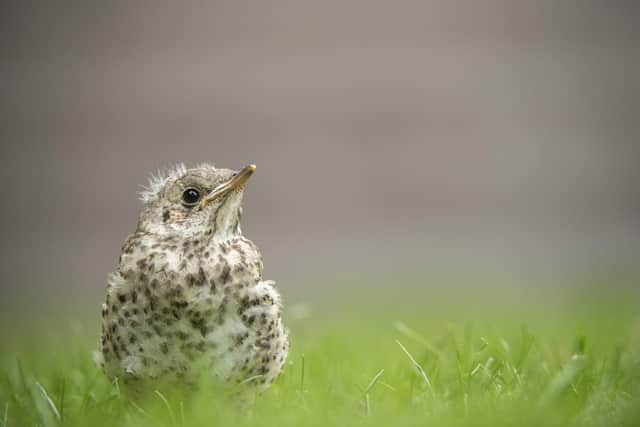The wildlife column with the RSPB’s Morwenna Alldis: Keep calm and step away from that baby bird


The RSPB is reminding the public that most baby birds found on the ground don’t need rescuing and should be left alone – it’s part of the natural fledging process.
At this time of year we get hundreds of calls from well-meaning members of the public about the seemingly helpless baby birds they’ve discovered on the ground.
Advertisement
Hide AdAdvertisement
Hide AdAnd with the past two years of lockdown spurring us to pay closer attention to our gardens and greenspaces, our now expert nature eyes may spot even more chicks than usual.
But most of the time it’s important that we resist the urge to ‘rescue’ the baby bird – this is a natural part of the bird’s development, so keep calm and step away.
Just before baby birds are ready to tentatively extend a wing, wiggle a tail feather and take flight for the first time, they leave their nest – “fledge” as it’s called.
Fledglings then spend a couple of days on the ground and around the nest developing their final flight feathers.
Advertisement
Hide AdAdvertisement
Hide AdThe fledglings will appear fully feathered and hop around your garden in broad daylight – hence why members of the public are convinced they need rescuing.
Another common fear is that the fledgling has been deserted by its parents. But fledglings are extremely unlikely to be abandoned.
Mum and dad are probably off gathering food or hiding nearby with a beady eye on their young, waiting for you to leave. Parents know best and are the experts in rearing their young.
There are just a few situations when the public should lend a friendly helping hand:
Advertisement
Hide AdAdvertisement
Hide AdImmediate Danger: If the baby bird is found on a busy road or path, and if it is safe to do so, we advise it is picked up and moved a short distance to a safer place - this must be within hearing distance of where the fledgling was found.
Similarly, if you discover your cat or dog eyeing up a fledgling we recommend that you keep your domestic pet indoors as much as possible.
Injury: If the fledgling is injured or caught by a cat, the quickest way to get it medical help is often taking it to your local vets, most treat wild birds for free but do call ahead first. You could also contact your local wildlife rescue centre, found here: helpwildlife.co.uk/ Or call the RSPCA on: 0300 1234 999.
Nestlings: If a baby bird is discovered on the ground that is either unfeathered or covered only in its fluffy nestling down, it has likely fallen out of its cosy nest ahead of schedule. Very occasionally it is possible to put these babies back in their nest, but only if you are 100% sure of the nest it has fallen from.
Advertisement
Hide AdAdvertisement
Hide AdGrounded swift: For full guidance, visit here: bit.ly/GroundedSwift
Barn owl chick: If found on the floor, first confirm it is a barn owl not tawny owl (light in colour, dark eyes and eyelids). Note the exact location where you found it.
It is not normal for young Barn Owls to be out of the nest before they can fly, if left they will likely be ignored by their parents and not survive. Contact a local rescuer, the Barn Owl Trust or the RSPCA to help.
Ducks and Ducklings: For full guidance visit here: bit.ly/ducknests
Advertisement
Hide AdAdvertisement
Hide AdOccasionally, a parent bird will intentionally eject a chick from the nest if they sense it has an underlying health problem or is dying. It’s a harsh truth to stomach, as humans we want to fix things, but sometimes we need to allow the law of nature to run its course.
To find out how you can help the nature on your doorstep, visit: rspb.org.uk/natureonyourdoorstep